

This resource centre aims to help elucidate the definition of stress, help working adults look out for the signs and symptoms of stress and to equip them with healthy stress-coping mechanisms.
Stress. [1] Centre for Studies on Human Stress.
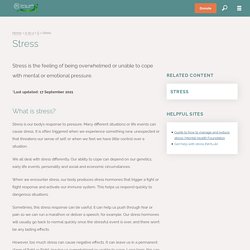
Recipe for Stress: Retrieved on 4 Apr 2018 from: [2] Segerstrom SC & Miller GE (2004) Psychological Stress and the Human Immune System: A Meta-Analytic Study of 30 Years of Inquiry. Psychological Bulletin, 130, 601-630. [3] American Psychological Association. Quiz: Are You Too Stressed Out at Work? Credit: bleakstar/Shutterstock Stress can come from many different aspects of your life, and a little stress now and then is totally normal.
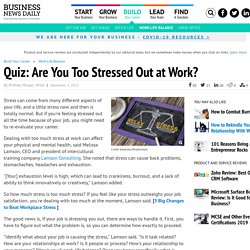
But if you're feeling stressed out all the time because of your job, you might need to re-evaluate your career. What are psychological and emotional signs of stress? Stress effects on the body. Musculoskeletal system When the body is stressed, muscles tense up.

Muscle tension is almost a reflex reaction to stress — the body's way of guarding against injury and pain. With sudden onset stress, the muscles tense up all at once, and then release their tension when the stress passes. Chronic stress causes the muscles in the body to be in a more or less constant state of guardedness. Millions of individuals suffer from chronic painful conditions secondary to musculoskeletal disorders. Relaxation techniques and other stress-relieving activities and therapies have been shown to effectively reduce muscle tension, decrease the incidence of certain stress-related disorders, such as headache, and increase a sense of well-being. Respiratory system The respiratory system supplies oxygen to cells and removes carbon dioxide waste from the body.
Some studies show that an acute stress — such as the death of a loved one — can actually trigger asthma attacks. Cardiovascular Endocrine The HPA axis Bowel. How Stress Affects Your Mental Health. Researchers at the Society for Neuroscience meeting in New Orleans (Oct 13-17) presented studies showing how stress, no matter its cause, alters brain circuitry in ways that can have long-term effects on mental health.
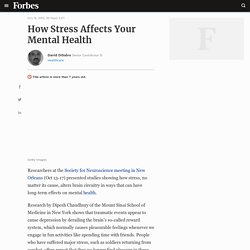
Research by Dipesh Chaudhury of the Mount Sinai School of Medicine in New York shows that traumatic events appear to cause depression by derailing the brain's so-called reward system, which normally causes pleasurable feelings whenever we engage in fun activities like spending time with friends. People who have suffered major stress, such as soldiers returning from combat, often report that they no longer find pleasure in these things.
Mice respond in a similar way to traumatic events, Chaudhury says. And his research shows that this response can be prevented by reducing the activity of certain brain cells involved in the reward system. [Source: NPR, October 15, 2012] A drug causing a similar outcome could eventually be effective in humans. Stress in the Workplace. In today's economic upheavals, downsizing, layoff, merger and bankruptcies have cost hundreds of thousands of workers their jobs.
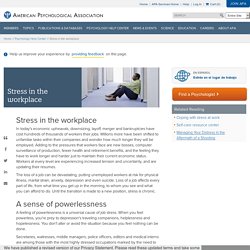
Millions more have been shifted to unfamiliar tasks within their companies and wonder how much longer they will be employed. Adding to the pressures that workers face are new bosses, computer surveillance of production, fewer health and retirement benefits, and the feeling they have to work longer and harder just to maintain their current economic status. Workers at every level are experiencing increased tension and uncertainty, and are updating their resumes. The loss of a job can be devastating, putting unemployed workers at risk for physical illness, marital strain, anxiety, depression and even suicide. Loss of a job affects every part of life, from what time you get up in the morning, to whom you see and what you can afford to do.
Watch out for unhealthy responses to stress. You probably have your own ways of dealing with stressful times.
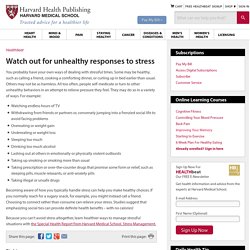
Some may be healthy, such as calling a friend, cooking a comforting dinner, or curling up in bed earlier than usual. Others may not be as harmless. All too often, people self-medicate or turn to other unhealthy behaviors in an attempt to relieve pressure they feel. They may do so in a variety of ways. For example: Watching endless hours of TV Withdrawing from friends or partners or, conversely jumping into a frenzied social life to avoid facing problems Overeating or weight gain Undereating or weight loss Sleeping too much Drinking too much alcohol Lashing out at others in emotionally or physically violent outbursts Taking up smoking or smoking more than usual Taking prescription or over-the-counter drugs that promise some form or relief, such as sleeping pills, muscle relaxants, or anti-anxiety pills Taking illegal or unsafe drugs.
Tips to Manage Anxiety and Stress. Skip to main content Conference Home Professional Education Home Membership Home Research & Practice Home About ADAA Home Tips to Manage Anxiety and Stress Advertisement When you're feeling anxious or stressed, the strategies listed below can help you cope.
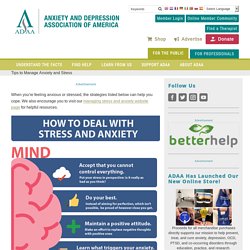
This infographic was created in collaboration with Mental Health America. Learn about free online therapy at BetterHelp.com. Coping with stress at work. Everyone who has ever held a job has, at some point, felt the pressure of work-related stress.
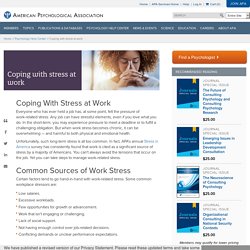
Any job can have stressful elements, even if you love what you do. In the short-term, you may experience pressure to meet a deadline or to fulfill a challenging obligation. List of helplines - Samaritans of Singapore (SOS) References.